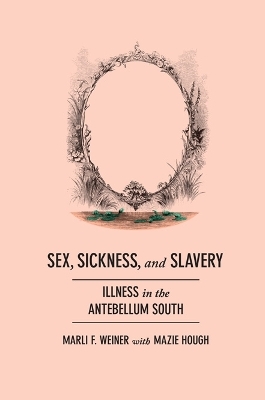
Sex, Sickness, and Slavery
Illness in the Antebellum South
Seiten
2012
University of Illinois Press (Verlag)
978-0-252-03699-6 (ISBN)
University of Illinois Press (Verlag)
978-0-252-03699-6 (ISBN)
- Titel z.Zt. nicht lieferbar
- Versandkostenfrei innerhalb Deutschlands
- Auch auf Rechnung
- Verfügbarkeit in der Filiale vor Ort prüfen
- Artikel merken
Shows how white Southern doctors used science to defend slavery
Marli F. Wiener skillfully integrates the history of medicine with social and intellectual history in this study of how race and sex complicated medical treatment in the antebellum South. Sex, Sickness, and Slavery argues that Southern physicians' scientific training and practice uniquely entitled them to formulate medical justification for the imbalanced racial hierarchies of the period. Challenged with both helping to preserve the slave system (by acknowledging and preserving clear distinctions of race and sex) and enhancing their own authority (with correct medical diagnoses and effective treatment), doctors sought to understand bodies that did not necessarily fit into neat dichotomies or agree with suggested treatments. Focusing on Southern states from Virginia to Alabama, Weiner examines medical and lay perspectives on the body through a range of sources, including medical journals, notes, diaries, daybooks, and letters. These personal and revealing sources show how physicians, medical students, and patients--both free whites and slaves--felt about vulnerability to disease and mental illnesses, how bodily differences between races and sexes were explained, and how emotions, common sense, working conditions, and climate were understood to have an effect on the body. Physicians' authority did not go uncontested, however. Weiner also describes the ways in which laypeople, both black and white, resisted medical authority, clearly refusing to cede explanatory power to doctors without measuring medical views against their own bodily experiences or personal beliefs. Expertly drawing the dynamic tensions during this period in which Southern culture and the demands of slavery often trumped science, Weiner explores how doctors struggled with contradictions as medicine became a key arena for debate over the meanings of male and female, sick and well, black and white, North and South.
Marli F. Wiener skillfully integrates the history of medicine with social and intellectual history in this study of how race and sex complicated medical treatment in the antebellum South. Sex, Sickness, and Slavery argues that Southern physicians' scientific training and practice uniquely entitled them to formulate medical justification for the imbalanced racial hierarchies of the period. Challenged with both helping to preserve the slave system (by acknowledging and preserving clear distinctions of race and sex) and enhancing their own authority (with correct medical diagnoses and effective treatment), doctors sought to understand bodies that did not necessarily fit into neat dichotomies or agree with suggested treatments. Focusing on Southern states from Virginia to Alabama, Weiner examines medical and lay perspectives on the body through a range of sources, including medical journals, notes, diaries, daybooks, and letters. These personal and revealing sources show how physicians, medical students, and patients--both free whites and slaves--felt about vulnerability to disease and mental illnesses, how bodily differences between races and sexes were explained, and how emotions, common sense, working conditions, and climate were understood to have an effect on the body. Physicians' authority did not go uncontested, however. Weiner also describes the ways in which laypeople, both black and white, resisted medical authority, clearly refusing to cede explanatory power to doctors without measuring medical views against their own bodily experiences or personal beliefs. Expertly drawing the dynamic tensions during this period in which Southern culture and the demands of slavery often trumped science, Weiner explores how doctors struggled with contradictions as medicine became a key arena for debate over the meanings of male and female, sick and well, black and white, North and South.
Marli F. Weiner (1953-2009) was Adelaide and Alan Bird Professor of History at the University of Maine and the author of several books, including Place and Gender: Women in Maine History and Plantation Women: South Carolina Mistresses and Slaves, 1830-1880.Mazie Hough is an assistant professor of history and women's studies and the associate director of the Women in the Curriculum and Women's Studies program at the University of Maine. She is the author of Rural Unwed Mothers: An American Experience, 1870-1950.
| Verlagsort | Baltimore |
|---|---|
| Sprache | englisch |
| Maße | 156 x 235 mm |
| Gewicht | 454 g |
| Themenwelt | Geschichte ► Allgemeine Geschichte ► Neuzeit (bis 1918) |
| Geisteswissenschaften ► Geschichte ► Regional- / Ländergeschichte | |
| Studium ► Querschnittsbereiche ► Epidemiologie / Med. Biometrie | |
| Studium ► Querschnittsbereiche ► Geschichte / Ethik der Medizin | |
| Sozialwissenschaften ► Soziologie | |
| ISBN-10 | 0-252-03699-9 / 0252036999 |
| ISBN-13 | 978-0-252-03699-6 / 9780252036996 |
| Zustand | Neuware |
| Haben Sie eine Frage zum Produkt? |
Mehr entdecken
aus dem Bereich
aus dem Bereich
Giordano Bruno - ein ketzerisches Leben
Buch | Hardcover (2024)
C.H.Beck (Verlag)
29,90 €
das dramatische 16. Jahrhundert
Buch | Hardcover (2024)
Rowohlt Berlin (Verlag)
34,00 €


